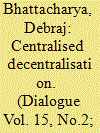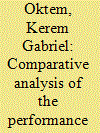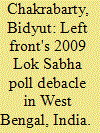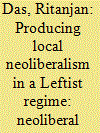| Srl | Item |
| 1 |
ID:
126664


|
|
|
| 2 |
ID:
114013


|
|
|
|
|
| Publication |
2012.
|
| Summary/Abstract |
This article compares the fortunes of the government coalitions under the leadership of the Communist Party of India (Marxist) or CPI(M) in Kerala, West Bengal and Tripura. The pattern of development and the success of the coalitions differ. In Kerala, the Left has lost every other election, whereas in West Bengal and Tripura, it has won many consecutive elections. West Bengal has seen stagnation in terms of human development, whereas Kerala and Tripura turned-to different degrees-into model states for human development. It is argued that the reasons for these different paths are to be found in the different strategies followed by the regional party units. Developmental success has been delivered through a mobilisation-based approach which has been followed inKerala and Tripura, but given up in West Bengal. This study explores thethree cases and elaborates on the reasons for the choice of strategies in the three states.
|
|
|
|
|
|
|
|
|
|
|
|
|
|
|
|
| 3 |
ID:
120842


|
|
|
|
|
| Publication |
2013.
|
| Summary/Abstract |
In 2011, after thirty-four years in power, the Communist Party of IndiaMarxist-led Left Front in West Bengal was voted out of power. The Left Front was the world's longest running communist government to be elected to office. The Left Front governed a population larger than most European, African, and Latin American democracies. This essay examines the rise and decline of the parliamentary communist movement in Bengal. The authors argue that the prominence of the communist movement can be traced to a social imaginaire and a notion of "social citizenship" that the (undivided) communists developed through their participation in grassroots-level workers, peasants, and refugee movements, and equally crucially, through hegemonic interventions in "culture" since the 1940s. This social imaginaire became the basis of a "commonsensical idiom" in Bengal through the political practice of the communists, parliamentary and otherwise. The decline of the parliamentary communist influence started when their core constituency of peasants and workers perceived them to be violating this basis of social citizenship in the wake of their adoption of neoliberal policies of development beginning in the 1990s. The regional noncommunist opposition in West Bengal in 2011 captured the imagination of the electorate by appropriating and translating this long developed notion of social citizenship against the Left government.
|
|
|
|
|
|
|
|
|
|
|
|
|
|
|
|
| 4 |
ID:
104107


|
|
|
|
|
| Publication |
2011.
|
| Summary/Abstract |
Left front's 2009 Lok Sabha poll debacle in West Bengal, India
This paper demonstrates that left front is no longer unassailable in West Bengal after three decades of rule. It identifies the specific reasons for the Left front electoral debacle in the 2009 Lok Sabha elections. The paper also argues that the left front is caught between the contrasting imperatives of adapting to changing socioeconomic conditions in liberalizing India, while concurrently attempting to remain true to its traditional communist ideology and support base in a globalized world
|
|
|
|
|
|
|
|
|
|
|
|
|
|
|
|
| 5 |
ID:
168569


|
|
|
|
|
| Summary/Abstract |
This paper presents a theoretical reassessment of a contentious chapter in India’s economic liberalisation – the case of West Bengal, a state ruled by the pro-labour ‘Left Front’ coalition, led by the Communist Party of India-Marxist (CPIM) from 1997 to 2011. The onset of neoliberalism in India had naturally created a serious political dilemma for the CPIM, but it eventually transitioned to a private-industrialisation agenda, thus prompting serious questions of ideological deviation. While the political-economy of the CPIM/Left Front and its industrial fortunes have been extensively scrutinised, this study introduces a rather different theoretical perspective to the story. Going back to the initial period of policy transition (c.1994), it uses the analytical categories of local neoliberalisms and populist transition to show how the state of affairs in West Bengal under the CPIM was demonstrative of a particular variant of interventionist neoliberal governmentality, characterised by a gradual intensification of pro-market impulses. Furthermore, the study also contextualises West Bengal within wider political economic trends, arguing that pro-market transitions by populist regimes tend to be characterised by a series of mobile calculative techniques of governing, embedded in local historical and geographical specificities and localised relationships.
|
|
|
|
|
|
|
|
|
|
|
|
|
|
|
|